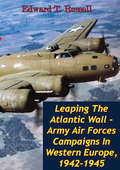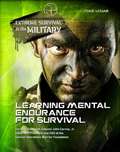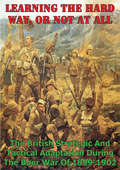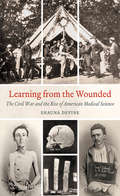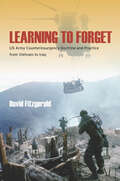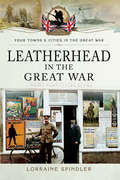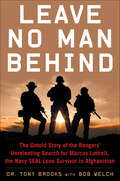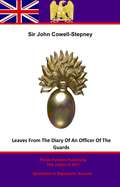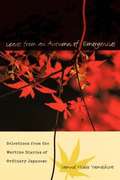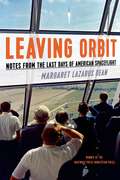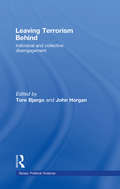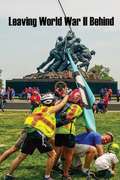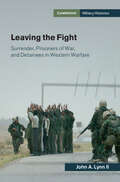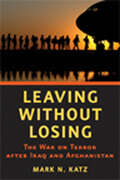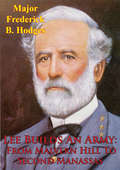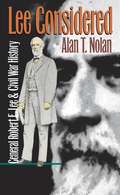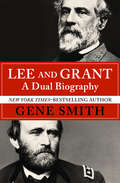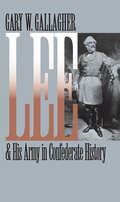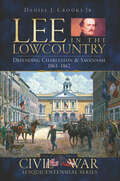- Table View
- List View
Leaping The Atlantic Wall - Army Air Forces Campaigns In Western Europe, 1942-1945 [Illustrated Edition] (The U.S. Army Air Forces in World War II #4)
by Edward T. RussellIncludes 20 illustrationsOn December 7, 1941, the Japanese empire attacked the U.S. military installations in Hawaii. Four days later, Germany's dictator, Adolf Hitler, fulfilling a treaty with Japan, declared war on the United States. Having sealed with that act the developing alliance between the United States and Great Britain, Hitler's Third Reich speeded construction of a formidable "Atlantic wall," to protect the exposed beaches of the Netherlands, Belgium, and northern France. This rampart was a massive system of fortifications, obstacles, and warning centers intended to thwart an Anglo-American invasion of Nazi-occupied Western Europe. Breaching the Atlantic wall of Hitler's "Fortress Europe" was the major strategic problem confronting British and U.S. military planners in late 1941. The two Allies based their offensive strategy on the belief that Germany was the strongest of the Axis powers and therefore should be defeated first. An air offensive against Germany was an important component of this strategy. Properly conducted, it would enable the Allies to leap the Atlantic wall and damage the industrial foundations of the Third Reich well before Allied ground troops penetrated the coastal barrier. The Allies held the air forces in the Pacific and Far East to a minimum and concentrated on building a formidable force on English soil capable of striking the Nazi heartland and, eventually, of supporting a cross-channel invasion and a victorious Allied advance across Europe.
Learn to Lead Volume Three Indirect Leadership ( Civil Air Patrol Cadet Programs )
by Civil Air PatrolThis third volume contains three chapters: The Cadet Officer, The Staff Officer, and The Leader as Commander.
Learning Large Lessons
by David E. JohnsonThe relative roles of U.S. ground and air power have shifted since the end of the Cold War. At the level of major operations and campaigns, the Air Force has proved capable of and committed to performing deep strike operations, which the Army long had believed the Air Force could not reliably accomplish. If air power can largely supplant Army systems in deep operations, the implications for both joint doctrine and service capabilities would be significant. To assess the shift of these roles, the author of this report analyzed post?-Cold War conflicts in Iraq (1991), Bosnia (1995), Kosovo (1999), Afghanistan (2001), and Iraq (2003). Because joint doctrine frequently reflects a consensus view rather than a truly integrated joint perspective, the author recommends that joint doctrine-and the processes by which it is derived and promulgated-be overhauled. The author also recommends reform for the services beyond major operations and campaigns to ensure that the United States attains its strategic objectives. This revised edition includes updates and an index.
Learning Mental Endurance for Survival
by Chris McnabElite Special Forces units are often assigned to the most difficult missions. They must be prepared for the challenges they will face. This means being skilled and physically fit, but it also means being mentally tough. During most basic-training programs, recruits will be yelled at by instructors, deprived of sleep, and forced to run for miles. Under these difficult conditions, they will be required to make constant decisions. Only the toughest recruits will graduate, and they need certain traits to make it through: * intelligence * self-control * courage * knowledge * resistance to pain and discomfort * team spirit
Learning The Hard Way, Or Not At All: The British Strategic And Tactical Adaptation During The Boer War Of 1899-1902
by Major Rob B. McClaryThe United States' current strategic environment is increasingly complex, with security, economic, and humanitarian interests around the world. Consequently, the United States' military may be called upon at any time to perform missions ranging from peacekeeping to total war, in environments ranging from the desserts of South West Asia to the jungles of Central America, against enemies ranging from Somali warlords to Chinese divisions. This uncertainty prevents the United States' military from organizing, equipping, and training for any specific situation. Therefore, to be successful the United States military must be capable of quickly adapting to the particulars of its mission when called.In the late 1800's England found itself in much the same position, with its military engaged around the world protecting its diverse and widely-dispersed interests. In 1899 when it went to war against the Boers it found its military unsuited for the South African terrain, the effects of modern weaponry, and the unconventional Boer tactics. This paper examines the British military's strategy and tactics, and how they changed throughout the war. Ultimately it determines that the British failed to adapt their strategy and tactics effectively throughout the war. Although their performance varied from commander to commander, and from unit to unit, the British typically resisted change, for various reasons, even when the need for change was pressing.
Learning from the Wounded
by Shauna DevineNearly two-thirds of the Civil War's approximately 750,000 fatalities were caused by disease--a staggering fact for which the American medical profession was profoundly unprepared. In the years before the war, training for physicians in the United States was mostly unregulated, and medical schools' access to cadavers for teaching purposes was highly restricted. Shauna Devine argues that in spite of these limitations, Union army physicians rose to the challenges of the war, undertaking methods of study and experimentation that would have a lasting influence on the scientific practice of medicine. Though the war's human toll was tragic, conducting postmortems on the dead and caring for the wounded gave physicians ample opportunity to study and develop new methods of treatment and analysis, from dissection and microscopy to new research into infectious disease processes. Examining the work of doctors who served in the Union Medical Department, Devine sheds new light on how their innovations in the midst of crisis transformed northern medical education and gave rise to the healing power of modern health science.
Learning to Fight: Military Innovation and Change in the British Army, 1914–1918 (Cambridge Military Histories)
by Aimée FoxLearning, innovation and adaptation are not concepts that we necessarily associate with the British army of the First World War. Yet the need to learn from mistakes, to exploit new opportunities and to adapt to complex situations are enduring and timeless. This revealing work is the first institutional examination of the army's process for learning during the First World War. Drawing on organisational learning and management theories, Aimée Fox critiques existing approaches to military learning in wartime. Focused around a series of case studies, the book ranges across multiple operational theatres and positions the army within a broader context in terms of its relationships with allies and civilians to reveal that learning was more complex and thoroughgoing than initially thought. It grapples with the army's failings and shortcomings, explores its successes and acknowledges the inherent difficulties of learning in a desperate and lethally competitive environment. Analyses multiple operational theatres, allowing readers to better understand the challenges facing the British army during the war. Proposes a new model for learning in military organisations which will appeal to anyone interested in the challenges of learning in complex organisations. Provides a new and illuminating case study on organisational learning and innovation that demonstrates how innovation is not the preserve of modern military forces.
Learning to Forget: US Army Counterinsurgency Doctrine and Practice from Vietnam to Iraq
by David FitzgeraldLearning to Forgetanalyzes the evolution of US counterinsurgency (COIN) doctrine over the last five decades. Beginning with an extensive section on the lessons of Vietnam, it traces the decline of COIN in the 1970s, then the rebirth of low intensity conflict through the Reagan years and the conflict in Bosnia, culminating in the campaigns in Iraq and Afghanistan. It explains how the lessons of Vietnam led the Army to Iraq and the way in which their confronting and reimagining of these lessons offered them a way out of that war. In the process it provides an illustration of how military leaders make use of history and demonstrates the difficulties of drawing lessons from the past that can usefully be applied to contemporary circumstances. The book outlines how the construction of lessons is tied to the construction of historical memory and describes the interplay between the two processes—demonstrating how histories are constructed to serve the needs of the present. In so doing, it creates a new theory of doctrinal development.
Leatherhead in the Great War (Your Towns & Cities in the Great War)
by Lorraine SpindlerAt the beginning of the twentieth century, Leatherhead was alive with celebration. The Boer War had ended in May 1902, King Edward VIIs Coronation followed in August and the had town blossomed into one of prosperous development.Things quickly changed when the war broke out in 1914, leaving the town papered with recruiting posters and swarming with soldiers. The upheaval was especially felt by the local families as they initially waved off over 400 Leatherhead men into the forces. Those left behind attempted to live a normal life in extraordinary circumstances, with Zeppelin raids in nearby Guildford and Croydon, which encouraged Leatherheads newspapers to offer insurance against the destruction of homes, the banning of lights after dark and fines for those who ignored the dictates. Added to the locals distress was the news of the high casualty rate of local soldiers and those previously billeted in the town, wiped out at the Battle of Delville Wood.The spring of 1918 felt especially bleak with shortages of food, labour, fuel and little prospect of an end to the conflict. However, later that year the end of war was finally declared. Of the 983 Leatherhead men who served, 163 were dead.On 19 July 1919, Leatherhead joined with the nation to celebrate peace. A lunch for returning servicemen was laid out and a procession of over 2,000 Leatherhead residents proceeded to Randalls Park. As the Silver Band played the town rejoiced with fireworks, dancing and the customary bonfire. Though warmed by the flames of celebration, Leatherhead was irrevocably altered.
Leave No Man Behind: The Untold Story of the Rangers' Unrelenting Search for Marcus Luttrell, the Navy SEAL Lone Survivor in Afghanistan
by Bob Welch Tony BrooksA story of courage, perseverance, and patriotism behind the 75th Ranger Regiment's rescue mission following one of the deadliest Special Ops incidents in Afghanistan—a grueling search for twelve Navy SEAL casualties and eight downed Night Stalkers . . . but just one lone survivor On June 28th, 2005, a four-man Navy SEAL reconnaissance team under Operation Red Wings was ambushed in northeastern Afghanistan—as depicted in the book and film Lone Survivor. A quick reaction force was dispatched. Turbine 33, carrying eight Navy SEALs and eight members of the 160th Special Operations Aviation Regiment, was struck by a rocket propelled grenade—careening the dual rotor Chinook toward the rugged peak of Sawtalo Sar. The result was the single deadliest incident in Special Operations history at the time. Commanders called on the largest element of US Special Forces, the 75th Ranger Regiment. The rescue mission: Operation Red Wings II. Author Tony Brooks gives a first-hand account of the daring recovery of Turbine 33 and the subsequent search for the remaining compromised Navy SEAL recon team—one of whom was Marcus Luttrell, the lone survivor. The Rangers were up against lack of intel, treacherous terrain, violent weather, and an enemy that was raised to fight. Tony Brooks lived—and many of his fellow Rangers died—by the axiom, “Leave No Man Behind.” He is the first to tell the story other books and films have omitted, one of overcoming overwhelming odds to accomplish a mission: to bring every American soldier home.
Leaves From The Diary Of An Officer Of The Guards
by Pickle Partners Publishing Sir John Cowell-StepneyThis ebook is purpose built and is proof-read and re-type set from the original to provide an outstanding experience of reflowing text for an ebook reader. Originally written under the nom de plume of "A Veteran Comrade", the leaves of Sir John Cowell-Stepney's diary make for a fascinating read as he recounts his experiences during the Peninsular Campaign and his other anecdotes of his military career. Commissioned in the Grenadier Guards in May 1809 as an Ensign, and rose to the rank of Lt-Colonel in 1830. In his later life he was active in politics as a Liberal Member of parliament and the High Sheriff of Carmarthenshire. Focusing on the campaigns of 1810 and 1811 in particular, the author describes his experiences vividly from his initial landing in Portugal, throughout his varied trials of the British army officer in the Peninsular. Major battles that his was involved in such as Fuentes D'Oñoro, Albuera and perhaps the best account of the siege and assault of Cuidad Rodrigo, are covered in his inimitable style. Reminiscent in tone to Kincaid's "Adventures in the Rifle Brigade", with a jaunty self-deprecating humour, and eye for detail. A classic of the Genre. Text taken, whole and complete, from the 1854 edition, published in London by Chapman. Original - 312 pages. Author- Sir John Cowell-Stepney (1791-1877) Linked TOC.
Leaves From a War Diary
by James G. HarbordGeneral Harbord brought to his service in France a long and honorable record as fighting man. Nor did he depart from this tradition as his brilliant and all-too-brief command of the famous Second Division attests. Here he differed from his colleagues in the other armies notably the late General Sir John S. Cowans, who was Quartermaster General of the British forces. Most of these men had been trained and operated solely in supply. General Harbord, on the other hand, is the line officer who proved his mettle as administrator as well.This book was originally written in the form of a diary not intended for outside eyes. It therefore embodies a wealth of intimate and naïve comment. Combined with this is a deep insight into the men and conditions that marked an epoch. The revelations are rich and not without permanent significance. Best of all they disclose the vision and character of a soldier as modest as he is capable. What follows is a genuine contribution to the history of the world war.—Isaac F. Marcosson
Leaves from an Autumn of Emergencies: Selections from the Wartime Diaries of Ordinary Japanese
by Samuel YamashitaThis collection of diaries gives readers a powerful, firsthand look at the effects of the Pacific War on eight ordinary Japanese. Immediate, vivid, and at times surprisingly frank, the diaries chronicle the last years of the war and its aftermath as experienced by a navy kamikaze pilot.
Leaving Lucy Pear
by Anna Solomon'Stunning language, raw emotion and profound wisdom' Celeste Ng, author of Everything I Never Told You'Solomon's strong prose and fleet pacing consistently provide the essential pleasures of a good story well told' Maggie Shipstead, The New York Times Book ReviewOne night in 1917 Beatrice Haven creeps out of her uncle's house on Cape Ann, Massachusetts, leaves her newborn baby at the foot of a pear tree, and watches as another woman claims the child as her own. A gifted pianist bound for Radcliffe, Bea plans to leave her shameful secret behind and make a fresh start. Ten years later, Prohibition is in full swing, post-WWI America is in the grips of rampant xenophobia, and Bea has returned to her uncle's house, seeking a refuge from her unhappiness. But the rum-running manager of the local quarry inadvertently reunites her with Emma Murphy, the headstrong Irish Catholic woman who has been raising her abandoned child - now a bright, bold, cross-dressing girl named Lucy Pear, with secrets of her own...
Leaving Orbit: Notes from the Last Days of American Spaceflight
by Margaret Lazarus DeanWinner of the Graywolf Press Nonfiction Prize, a breathtaking elegy to the waning days of human spaceflight as we have known itIn the 1960s, humans took their first steps away from Earth, and for a time our possibilities in space seemed endless. But in a time of austerity and in the wake of high-profile disasters like Challenger, that dream has ended. In early 2011, Margaret Lazarus Dean traveled to Cape Canaveral for NASA's last three space shuttle launches in order to bear witness to the end of an era. With Dean as our guide to Florida's Space Coast and to the history of NASA, Leaving Orbit takes the measure of what American spaceflight has achieved while reckoning with its earlier witnesses, such as Norman Mailer, Tom Wolfe, and Oriana Fallaci. Along the way, Dean meets NASA workers, astronauts, and space fans, gathering possible answers to the question: What does it mean that a spacefaring nation won't be going to space anymore?
Leaving Terrorism Behind: Individual and Collective Disengagement (Political Violence)
by John Horgan Tore BjorgoThis new edited volume expands our understanding of the processes by which individuals and groups disengage from terrorism. While there has been a growing awareness of the need to understand and prevent processes of radicalization into terrorism, disengagement and deradicalization from terrorism have long been neglected areas in research on terrorism. This book uses empirical data to explore how and why individuals and groups disengage from terrorism, and what can be done to facilitate it. The work also presents a series of case studies of disengagement programmes, from Colombia, northern Europe, Italy, Yemen, Saudi Arabia, Indonesia, Singapore and Malaysia, comparing and assessing their various strengths and weaknesses. In light of the lessons learned from these cases, this book describes and explains the potential for new developments in counter-terrorism. This book will be of great interest to all students of terrorism studies, war and conflict studies, international security and politics in general, as well as professionals in the field of counter-terrorism.
Leaving World War II Behind
by David SwansonThis book documents the case that World War II happened in such a different world that it has little relevance to today's foreign policy, as well as the case that U.S. participation in WWII was not justifiable. Specifically, WWII was not fought to rescue anyone from persecution, was not necessary for defense, was the most damaging and destructive event yet to occur, and would not have happened had any one of these factors been missing: World War I, the manner in which WWI was ended, U.S. funding and arming of Nazis, a U.S. arms race with Japan, U.S. development of racial segregation, U.S. development of eugenics, U.S. development of genocide and ethnic cleansing, or the U.S. and British prioritization of opposing the Soviet Union at all costs. The author corrects numerous misconceptions about the most popular and misunderstood war in western culture, in order to build a case for moving to a world beyond war.
Leaving the Fight: Surrender, Prisoners of War, and Detainees in Western Warfare (Cambridge Military Histories)
by John A. Lynn IISurrender in warfare has determined the fate of governments, states, and nations. It has reduced powerful commanders to powerless captives and inflicted submission, degradation, and even death on common soldiers held as prisoners of war. It has also led to civilian detainees being grossly mistreated and murdered. However, surrender, prisoners of war, and detainees have rarely been addressed as general phenomena in warfare. Leaving the Fight is then an essential history of the evolution of surrender from the Middle Ages to the present day. John A. Lynn II explores the different forms taken by surrender, from the abject capitulation of armies and states to the withdrawal of forces from military interventions deemed to be unwinnable, such as in Vietnam and Afghanistan. He also considers the fates of prisoners of war and civilians detained by military forces from harsh treatment intended to intimidate foes to attempts to win over hearts and minds.
Leaving without Losing: The War on Terror after Iraq and Afghanistan
by Mark N. KatzAs the United States withdraws its combat troops from Iraq and Afghanistan, politicians, foreign policy specialists, and the public are worrying about the consequences of leaving these two countries. Neither nation can be considered stable, and progress toward democracy in them—a principal aim of America and the West—is fragile at best. But, international relations scholar Mark N. Katz asks: Could ending both wars actually help the United States and its allies to overcome radical Islam in the long term?Drawing lessons from the Cold War, Katz makes the case that rather than signaling the decline of American power and influence, removing military forces from Afghanistan and Iraq puts the U.S. in a better position to counter the forces of radical Islam and ultimately win the war on terror. He explains that since both wars will likely remain intractable, for Washington to remain heavily involved in either is counter-productive. Katz argues that looking to its Cold War experience would help the U.S. find better strategies for employing America’s scarce resources to deal with its adversaries now. This means that, although leaving Afghanistan and Iraq may well appear to be a victory for America’s opponents in the short term—as was the case when the U.S. withdrew from Indochina—the larger battle with militant Islam can be won only by refocusing foreign and military policy away from these two quagmires.This sober, objective assessment of what went wrong in the U.S.–led wars in Afghanistan and Iraq and the ways the West can disentangle itself and still move forward draws striking parallels with the Cold War. Anyone concerned with the future of the War on Terror will find Katz’s argument highly thought provoking.
Lee (With Photographs and Maps)
by Clifford DowdeyThe author presents a detailed account of the biography of Robert E. Lee and the Civil War.
Lee Builds An Army From Malvern Hill To Second Manassas
by Major Frederick B. HodgesRobert E, Lee, in his first campaign as the new commander of the Army of Northern Virginia, stopped the Union offensive against Richmond in a series of engagements known as the Seven Days. Although eventually successful, Confederate operations were clumsy and erratic and often missed opportunities to secure greater success. At the end of the Seven Days Lee reorganized his forces and began preparations for his next campaign. This new campaign, which resulted in the Battle of Second Manassas just two months later, is widely considered to be one of Lee's most brilliant operations.The purpose of this monograph is to identify the changes and improvements that occurred within Lee's army which enabled it to show this vast improvement in such a short time span. The monograph uses LTC James Dubik's model for campaign analysis which is a modification of the familiar "ends, ways, and means" characterization of campaign planning. It evaluates four components of a campaign: intellectual, cybernetic, psychological-physical, and harmonic as a methodology for comparative analysis.Despite his inexperience, Lee was able to learn from his first campaign. He could recognize what needed to be done and had the patience, intelligence, and courage to do it. Each of the adjustments and modifications he made were important but not decisive by themselves. It was the synergism of wise personnel and organization changes combined with improved operational planning which proved to be the secret in transforming Lee's troops into the legendary Army of Northern Virginia.
Lee Considered
by Alan T. NolanOf all the heroes produced by the Civil War, Robert E. Lee is the most revered and perhaps the most misunderstood. Lee is widely portrayed as an ardent antisecessionist who left the United States Army only because he would not draw his sword against his native Virginia, a Southern aristocrat who opposed slavery, and a brilliant military leader whose exploits sustained the Confederate cause. Alan Nolan explodes these and other assumptions about Lee and the war through a rigorous reexamination of familiar and long-available historical sources, including Lee's personal and official correspondence and the large body of writings about Lee. Looking at this evidence in a critical way, Nolan concludes that there is little truth to the dogmas traditionally set forth about Lee and the war.
Lee and Grant: A Dual Biography
by Gene SmithAn enthralling and richly detailed biography of two gifted military commanders who changed the course of American history. Their names are forever linked in the history of the Civil War, but Robert E. Lee and Ulysses S. Grant could not have been more dissimilar. Lee came from a world of Southern gentility and aristocratic privilege while Grant had coarser, more common roots in the Midwest. As a young officer trained in the classic mold, Lee graduated from West Point at the top of his class and served with distinction in the Mexican-American War. Grant's early military career was undistinguished and marred by rumors of drunkenness. As commander of the Confederate Army of Northern Virginia, Lee's early victories demoralized the Union Army and cemented his reputation as a brilliant tactician. Meanwhile, Grant struggled mightily to reach the top of the Union command chain. His iron will eventually helped turn the tide of the war, however, and in April 1864, President Abraham Lincoln gave Grant command of all Union forces. A year later, he accepted Lee's surrender at the Appomattox Court House. With brilliance and deep feeling, New York Times-bestselling author Gene Smith brings the Civil War era to vivid life and tells the dramatic story of two remarkable men as they rise to glory and reckon with the bitter aftermath of the bloodiest conflict in American history. Never before have students of American history been treated to a more personal, comprehensive, and achingly human portrait of Lee and Grant.
Lee and His Army in Confederate History
by Gary W. GallagherWas Robert E. Lee a gifted soldier whose only weaknesses lay in the depth of his loyalty to his troops, affection for his lieutenants, and dedication to the cause of the Confederacy? Or was he an ineffective leader and poor tactician whose reputation was drastically inflated by early biographers and Lost Cause apologists? These divergent characterizations represent the poles between which scholarly and popular opinion on Lee has swung over time. Now, in eight essays, Gary Gallagher offers his own refined thinking on Lee, exploring the relationship between Lee's operations and Confederate morale, the quality of his generalship, and the question of how best to handle his legacy in light of the many distortions that grew out of Lost Cause historiography.Using a host of contemporary sources, Gallagher demonstrates the remarkable faith that soldiers and citizens maintained in Lee's leadership even after his army's fortunes had begun to erode. Gallagher also engages aspects of the Lee myth with an eye toward how admirers have insisted that their hero's faults as a general represented exaggerations of his personal virtues. Finally, Gallagher considers whether it is useful--or desirable--to separate legitimate Lost Cause arguments from the transparently false ones relating to slavery and secession. Was Robert E. Lee a gifted soldier whose only weaknesses lay in the depth of his loyalty to his troops, affection for his lieutenants, and dedication to the cause of the Confederacy? Or was he an ineffective leader and poor tactician whose reputation was drastically inflated by early biographers and Lost Cause apologists? These divergent characterizations represent the poles between which scholarly and popular opinion on Lee has swung over time. In eight essays, Gary Gallagher offers his own refined thinking on Lee, exploring the relationship between Lee's operations and Confederate morale, the quality of his generalship, and the question of how best to assess his legacy in light of the many distortions that grew out of Lost Cause historiography.-->
Lee in the Lowcountry: Defending Charleston & Savannah 1861–1862 (Civil War Ser.)
by Daniel J. Crooks Jr.This Civil War biography sheds light on the Confederate General&’s first year serving the newly formed Southern Republic. Early in the Civil War, General Robert E. Lee was given command of the Department of South Carolina, Georgia and East Florida. Making him, in effect, the first line of defense for for Confederacy and two of its key cities: Charleston and Savannah. In Lee in the Lowcountry, Charleston historian Danny Crooks examines this period in Lee&’s career, in which he faced with confusion and convoluted loyalty among the ranks. Using Lee&’s own words and those of his contemporaries, Crooks helps the reader to understand why Lee, and only Lee, could bring order to the early chaos of the war. He also reveals how Lee acquired the two most famous trademarks of his wartime career while in the Lowcountry. Long hours in the saddle prompted Lee to grow his signature beard and, while at Pocotaligo, he acquired his beloved equine companion, Traveller.
